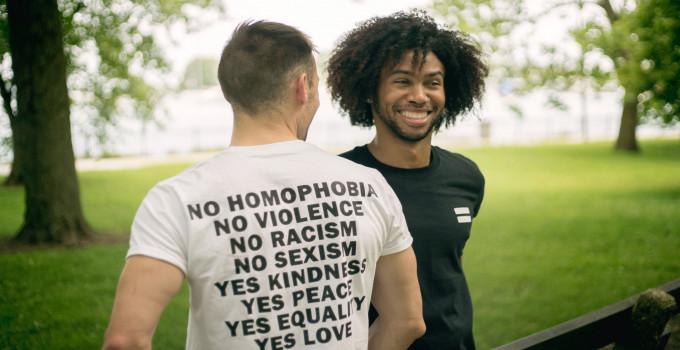Allyship
Tuesday 31 January 2023

Those outside of the community have a critical role in allowing for the progress toward a more inclusive society for LGBT+ persons through their allyship. If you agree in the equal treatment of people who identify as LGBT+ then you are an ally. However, much like the discussion that not being racist isn’t enough in the work towards a more equal society but that we must be anti-racist, straight individuals can utilise their voice and resources to become an active ally. It is these efforts which will lead to real change and progress.
How to be an active ally:
1. Research and educate yourself on LGBT+ History – as with all crucial social issues a great place to begin is educating yourself on the activism and effort of those that have come before. It’s crucial to understand what has been overcome in order to understand the work needed to progress further.
2. Familiarise yourself with the correct language – Make sure that you are familiar with the correct terms which are used by those in the LGBT+ community so that you can be respectful of their pronouns for instance and as to certain issues. It is alright not to be 100% but it is important to be respectful of the language and to actively seek to acquaint yourself with the terminology.
3. Discover what challenges the LGBT+ face in the present – Research the hardships and obstacles that LGBT+ individuals face today and the policies previously introduced and currently maintained which shape and enforce these.
4. Become a part of the effort and show support – Seek for platforms and movements which are working to dismantle the exclusionary narrative and become a part of this effort. Find events which are near you or able to be accessed online. Show that you stand for their rights to be treated and to exist with respect.
5. Align yourself with this mission in your day to day – Although it is a brilliant sign of allyship to attend a Pride March and cheer with members of the community it is also crucial that you seek to challenge bigoted conversations when they arise. This of course is only conducive if you feel it is a safe environment to do so and one in which the discussion will dismantle perhaps subconscious prejudice. Championing diversity and empowering LGBT+ individuals in your everyday conversations are a crucial part of shifting the narrative to a more inclusive one.
More information can be found on allyship here.
Pronouns
You cannot be certain of someone’s pronouns merely by looking at them so asking what they identify as, be that “she/her” or “they/them” among others, is a way in which to show your respect for their gender identity.
Referring to an individual with the incorrect pronoun can make them feel invalidated or disrespected. If you approach them with a pronoun and are corrected, it is best to gracefully apologise for your mistake and ensure that you use the right pronoun moving forward.
Do not make it a personal matter for yourself but respect that it is best to adopt the appropriate language and make the individual feel respected. Practicing this is a means by which to support for all gender identities and a sign of allyship.
Examples of pronouns:
She/her/hers – identify as female
He/him/his – identify as male
They/ Them/Theirs – a gender neutral pronoun for those who identify as non-binary
She/They – identifies as they/them but doesn’t mind being called She
He/They – identifies as they/them but doesn’t mind being called He
You can find further information on pronouns here.
It has been made possible for these to be incorporated into our social media profiles, such as on Instagram and LinkedIn. Doing so helps normalise the discussions around gender, making it a safe space for trans and non-binary communities to disclose their own. By using your own pronouns in signatures and on social media you are showcasing that you are not going to assume another’s gender and making the gender conversation a more inclusive one.
Further information on the importance of using pronouns on your social media platforms here.
Charities, Platforms and Resources
Just Like Us – Aiming to empower young people to be role models championing LGBT+ equality at school and work.
Human Dignity Trust – Defend the human rights of LGBT people globally
MindOut – Mental Health Service for LGBT+
Hidayah – Gender, Sexuality and Islam
Mermaid – Helping transgender, non-binary and gender diverse children, young people and their families
Resources
https://www.bl.uk/lgbtq-histories/articles/a-short-history-of-lgbt-rights-in-the-uk#
https://edition.cnn.com/interactive/2019/06/health/lgbtq-explainer/
https://www.history.com/news/how-activists-plotted-the-first-gay-pride-parades
http://internap.hrw.org/features/features/lgbt_laws/
https://prospect.org.uk/news/why-we-should-all-start-using-pronouns/
https://www.pinknews.co.uk/2019/04/03/lgbt-charities-supporting-donating/
https://www.them.us/story/ipride-flag-redesign-black-brown-trans-pride-stripes
https://www.stonewall.org.uk/about-us/news/come-out-lgbt-becoming-active-lgbt-ally
